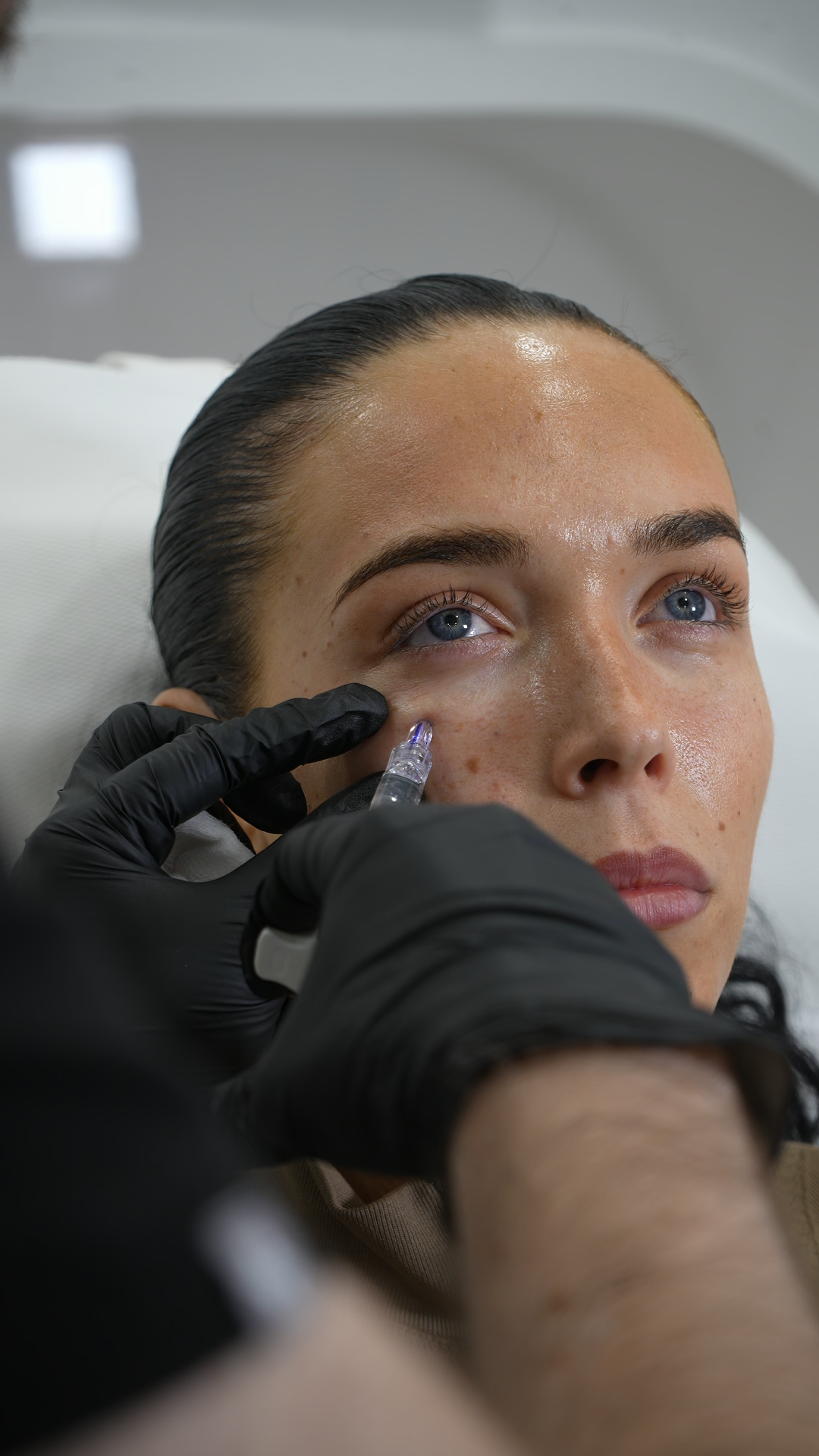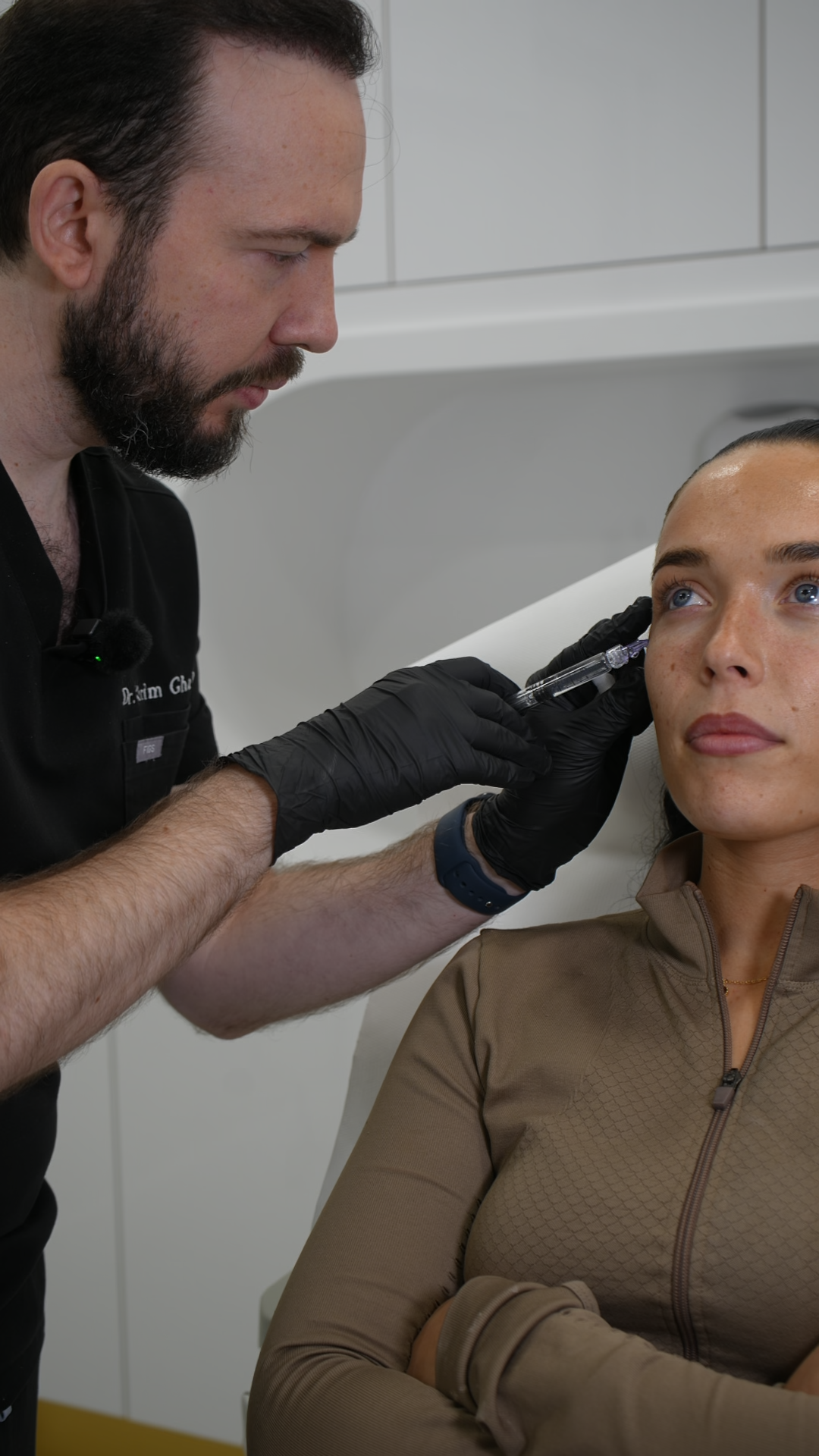Advanced regenerative injections to rejuvenate, hydrate, and repair your skin from within.
Polynucleotides Skin Treatment
Polynuceotides in Altrincham & London
What Are Polynucleotides?
Polynucleotides are an innovative injectable treatment designed to regenerate and repair the skin at a cellular level. They are made from purified DNA fragments, often derived from salmon DNA (PDRN), which are biocompatible and naturally recognised by the body. Once injected, they act as powerful bio-stimulators, encouraging your skin’s own cells to heal, restore, and strengthen themselves. Unlike Botox injections, that relax muscles, or dermal fillers, that add volume; polynucleotides improve the quality and function of your skin itself – making them one of the most advanced skin rejuvenation treatments.
from £325
What Can Polynucleotides Treat?
Polynucleotides are a versatile treatment that can be used across the face, under-eyes, neck, and body. They are particularly effective for areas that are difficult to treat with fillers or Botox. Common treatment areas and concerns include:
Under-eye skin quality, including dark circles, crepiness, and hollowing
Fine lines and wrinkles on the face, neck, and décolletage
Skin laxity and sagging caused by loss of elasticity
Dull, dehydrated, or tired-looking skin
Acne scars, textural irregularities, and sun damage
Redness, rosacea, and pigmentation issues
Treatment Journey: Typically, a full polynucleotide treatment course involves 2-3 sessions, with each session spaced out over several weeks to allow the skin to respond and regenerate. The beneficial effects can be maintained with follow-up treatments every 6-9 months, ensuring continued skin vitality.
Patient during Polynucleotide treatment with Dr Karim in Altrincham.
Understanding Polynucleotides
How Do Polynucleotides Work?
Polynucleotides work by stimulating fibroblast activity, which triggers the production of collagen and elastin – the building blocks of firm, youthful skin. They also boost the skin’s natural levels of hyaluronic acid, improving deep hydration, and act as antioxidants to protect against free radical damage. Together, these effects repair damaged tissue, improve skin elasticity, and restore a healthier, fresher appearance.
Benefits of Polynucleotides
The key benefit of polynucleotides is that they restore skin health from within. Patients often notice their skin feels smoother, firmer, and more radiant after treatment. Because the results come from your own skin’s regeneration process, the outcome looks completely natural – simply a fresher version of you.
Additional benefits include longer-lasting results, typically 6–12 months after a course of treatment; suitability for delicate areas such as the under-eyes where fillers may not be ideal; visible improvements in hydration, elasticity, and overall skin quality; minimal downtime, with only mild redness or swelling that fades within 24–48 hours; and safety, since polynucleotides are biocompatible and clinically proven for skin repair and rejuvenation.
Treatment Experience
A typical course involves 2–3 sessions spaced a few weeks apart. Improvements in skin hydration are often visible within the first couple of weeks, while firmer, smoother results develop after completing the course. Maintenance treatments once or twice a year can help sustain results. Each session takes around 30 minutes, and most patients return to normal activities immediately after treatment.
Request a Polynucleotide Consultation
Please let us know a little more about you, your skin concerns, and treatment you are interested in.
Frequently Asked Questions about Polynucleotides
-
Polynucleotides are regenerative injectable treatments made from purified DNA fragments, most commonly derived from salmon DNA (PDRN therapy). These DNA chains are biocompatible, meaning when injected, your body recognises them and uses them to trigger natural repair.
Once injected, polynucleotides act as bio-stimulators and improve collagen and elastin production, increase hydration, and repair damaged tissue.
Unlike many other aesthetic injectables, polynucleotides target the quality and health of the skin itself. They’re essentially skin care, but from inside out.
-
Yes. Polynucleotides have been used in regenerative medicine and aesthetics for many year and are back by clinical studies. They are highly purified, biocompatible, and sterile.
Because they work with your own skin’s biology rather than adding artificial volume, the risk of complications is low. Side effects are generally mild and temporary, such as slight redness, swelling, or bruising at the injection site, which usually resolves within 24 hours.
-
Most patients see visible improvements in hydration and skin quality within a few weeks of their first session, with firmer, smoother results developing after completing a course of treatments. Results typically last 6–12 months, depending on factors like skin quality, age, and lifestyle. To maintain long-term benefits, many patients schedule a maintenance treatment once or twice a year.
-
Polynucleotides and dermal fillers work in different ways, so it’s not about one being “better” but rather which is right for your goals. Dermal fillers replace lost volume or contour specific areas, like the lips or cheeks. Polynucleotides, on the other hand, don’t add volume — they repair and regenerate the skin itself. They’re ideal if you want to improve under-eye hollows, fine lines, scarring, or skin quality without changing the shape of your face. In many cases, patients choose a combination approach: fillers for structure and polynucleotides for skin health.
-
Once injected, polynucleotides:
Stimulate fibroblasts — the cells responsible for producing collagen and elastin.
Improve hydration by boosting natural hyaluronic acid levels in the skin.
Neutralise free radicals — reducing oxidative stress and protecting skin from environmental damage.
Encourage tissue regeneration, making them effective for acne scars, sun damage, and other skin irregularities.
This multi-action process makes them a truly regenerative injectable rather than a cosmetic quick fix.
-
Polynucleotides can be used across the face, under-eyes, neck, décolletage, and body. The most common treatment areas are:
Under-eyes – improving dark circles, hollowness, and crepiness.
Face – reducing fine lines, wrinkles, and skin laxity.
Neck and décolletage – restoring firmness and hydration to delicate skin.
Acne scars or sun damage – encouraging tissue repair and evening skin texture.
-
Patients often notice their skin looks more hydrated and refreshed within 1–2 weeks of their first session. The regenerative effects — firmer skin, smoother texture, reduced fine lines — become more noticeable after completing a course of 2–3 treatments, spaced a few weeks apart. Because the results come from your body’s own repair mechanisms, they look gradual, natural, and long-lasting.
-
No. While both treatments improve hydration, they work differently. Skin boosters (like Profhilo or Seventy Hyal) use hyaluronic acid to attract water and deeply hydrate the skin. Polynucleotides go further by stimulating collagen, elastin, and tissue regeneration — repairing damage and improving skin structure. Patients often use polynucleotides when they want more than hydration alone, especially for concerns like under-eye crepiness or scarring.
-
Treatment is generally well tolerated. A fine needle or cannula is used, and a topical numbing cream can be applied for comfort. Most patients describe it as mild discomfort rather than pain. Downtime is minimal — you may experience slight redness, swelling, or bruising at the injection sites, which settles within 24–48 hours. You can usually return to work and daily activities straight after.
Polynucleotides in Altrincham & London
Dr Karim has clinics for Polynucleotides in Altrincham (serving Manchester and Cheshire) and on Harley Street, London. Both offer a discreet, welcoming environment with the highest standards of safety and care.
Polynucleotides Altrincham – serving Hale, Bowdon, Alderley Edge, Hale Barns, Knutsford, Wilmslow, Sale, Timperley, and Mobberley.
Polynucleotides London – Harley Street, central London.



